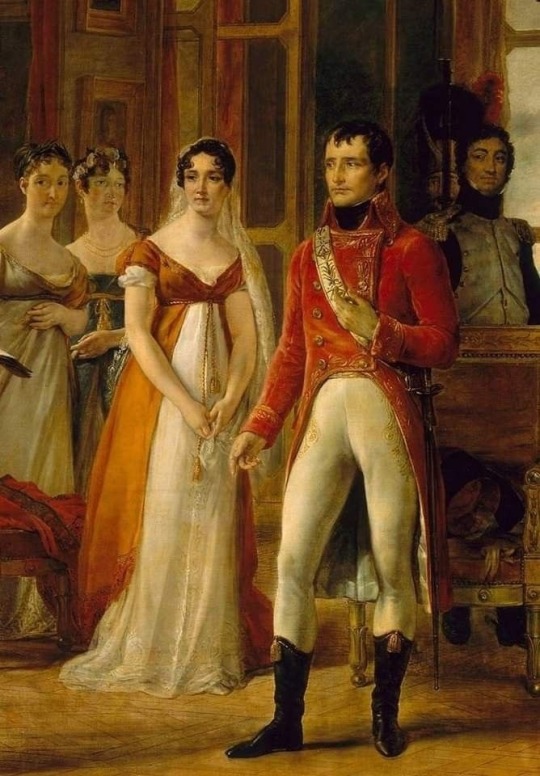#georges rouget
Explore tagged Tumblr posts
Text

Jacques-Louis David
Artists: Anonymous Artist, Georges Rouget (French, 1784-1869)
Date: c. 1813/1815
Medium: Oil on canvas
Collection: National Gallery of Art, Washington, DC, United States
Jacques-Louis David
Jacques-Louis David (30 August 1748 – 29 December 1825) was a French painter in the Neoclassical style, considered to be the preeminent painter of the era. In the 1780s, his cerebral brand of history painting marked a change in taste away from Rococo frivolity toward classical austerity, severity, and heightened feeling, which harmonized with the moral climate of the final years of the Ancien Régime.
David later became an active supporter of the French Revolution and friend of Maximilien Robespierre (1758–1794), and was effectively a dictator of the arts under the French Republic. Imprisoned after Robespierre's fall from power, he aligned himself with yet another political regime upon his release: that of Napoleon, the First Consul of France. At this time he developed his Empire style, notable for its use of warm Venetian colours. After Napoleon's fall from Imperial power and the Bourbon revival, David exiled himself to Brussels, then in the United Kingdom of the Netherlands, where he remained until his death. David had many pupils, making him the strongest influence in French art of the early 19th century, especially academic Salon painting.
#portrait#painting#oil on canvas#jacques louis david#french painter#georges rouget#french culture#man#seated#fine art#french history#costume#artist#paint brush#19th century painting
30 notes
·
View notes
Text

The Marriage Of Napoleon I and Marie Louise Archduchess Of Austria
Artist: Georges Rouget (French, 1783–1869)
Title: Marriage of Napoleon I and Marie Louise. 2 April 1810
Date: 1810
Medium: Oil on Canvas
Collection: Palace of Versailles, Paris, France
Description
Painting of the marriage ceremony of Napoleon I, Emperor of France, and Archduchess Marie Louise of Austria, eldest daughter of Emperor Franz I. of Austria, held in the Louvre chapel, 2 April 1810.
#painting#oil on canvas#marriage ceremony#napoleon i#marie louise of austria#early 19th century#french#european#french history#georges rouget#french painter#louvre chapel#wedding#people#costume
6 notes
·
View notes
Text
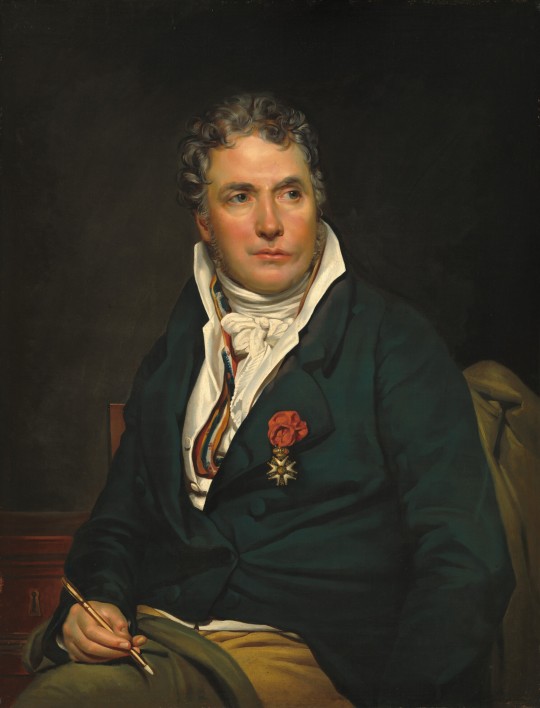
Studio of Georges Rouget - Jacques-Louis David
2 notes
·
View notes
Text
Women artists in Napoleonic France

(Young women copying: ‘Love begging Venus to forgive Psyche’ which was displayed at the 1808 Salon. Sketch by Georges Rouget)
Quotes from an article about women’s participation in the art world during the Napoleonic era.
Article:
Heather Belnap Jensen, “The Journal des Dames et des Modes: Fashioning Women in the Arts, c. 1800-1815,” Nineteenth-Century Art Worldwide 5, no. 1 (Spring 2006) (source)
“More and more women artists began exhibiting their work in public venues and receiving recognition for their contributions at this time. While only three women artists had participated in the 1789 biennial Salon, fifty participated in the Salon of 1806–an increase in women’s participation of over 1600 percent in seventeen years.”
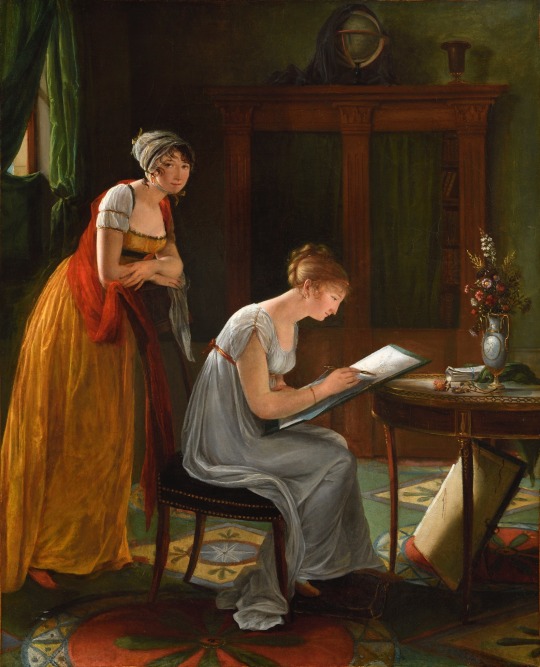
(Woman artist giving a drawing lesson — Self-portrait, 1810, by Louise-Adéone Drölling)
“We see a move away from the emphasis on the public sphere to the private space as motifs, intimating a valorization of a woman’s world. While history painting, which played such a crucial role in Revolutionary visual culture, remained the privileged genre at the turn of the century, the rise in portraiture, landscape, and genre painting in Napoleonic France indicates this shift in values.”
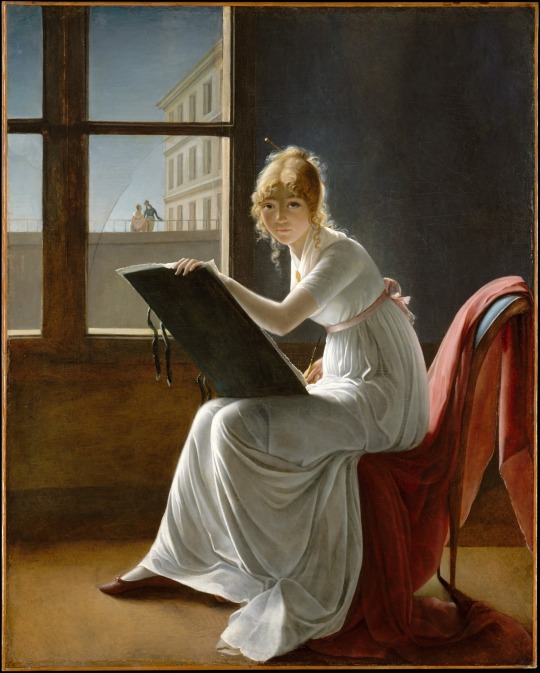
(Young Woman Drawing—Portrait of Charlotte du Val d'Ognes, 1801, by Marie-Denise Villers)
“Women’s journals, which often published art-related materials, have been largely overlooked in discussions of developments in late eighteenth-and early nineteenth-century French visual culture. This is surprising, given that bibliographies on art criticism of this period frequently cite items from these publications.”
One of the most influential women’s journal of the period was Journal des Dames et des Modes. It was created by Jean-Baptiste Sellèque and Pierre de La Mésangère in 1797 and continued until 1839.
“La Mésangère’s key collaborator during the Napoleonic period was a woman, Albertine Clément, née Hémery, a well-known figure in both journalistic and cultural circles in post-Revolutionary France, and that several women were regular contributors to this journal during this era.”
Annemarie Kleinert did a study on the journal:
“She determined that the journal targeted bourgeois women between the ages of 18 and 40 years old who could afford the annual subscription rate of 10 livres, and that the majority of subscribers during the period from 1800 to 1815 were from the provinces.”

(Portrait of a Young Woman Drawing Herself, early 1800s, by Louis-Léopold Boilly)
Interest from women in creating their own designs:
“Fashion plates that accompanied each issue of this journal gave visual testimony to this heightened interest in women’s artistic engagement. Indeed, women in fashion plates were sometimes presented in the act of sketching and drawing, as shown in a plate that appeared as an insert in an 1802 issue of the Journal des Dames et des Modes.”
The act of women creating art was compared to motherhood. In that way, women were encouraged to make art, but in terms which enforced traditional and patriarchal ideas:
“Furthermore, the vocabulary used by the author stresses the ways in which artistic creativity mirrors childbirth and elicits feelings of exaltation over one’s art that are similar to those evoked by motherhood when he writes that ‘she smiles at the objects which are born of her colors’ and calls the site of her production a ‘creative space.’”
There were opportunities for women to paint nude subjects for classical style art:
“Recent scholarship suggests that there were opportunities for such study in the Napoleonic era. By 1800, female students could attend anatomy classes given by the surgeon Sue and also by the École du Modèle Vivant at Versailles, and artist Adele Romilly reported that David, Régnault, and Guérin all provided mixed studios that offered courses on life drawing from the nude.”
One of the claims made against the women’s journals is that they were sexist. The author points out that it’s more complicated and not entirely true. The journals included laudatory reviews of paintings by female artists at the salons, biographies of women artists, such as Angelica Kauffmann, and published excerpts of pamphlets written by women, such as Angélique Mongez.
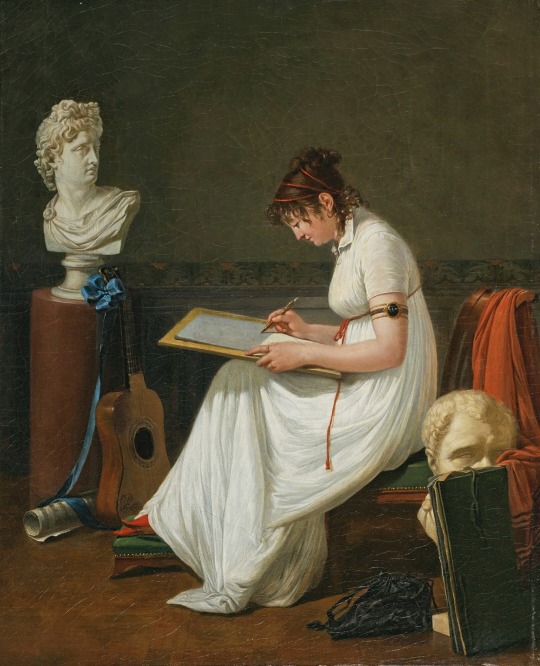
(Portrait of an Artist Drawing after the Antique, c. 1800s, Jean François Sablet)
However, the author also says there was a lot of anxiety about the increase in female participation in the art world, both as creators and as spectators. There were articles describing women at museums in derogatory terms. One in particular described a young girl being overcome by emotion at the sight of the statue of Apollo Belvedere and creating such a large scene that she had to be dragged away in tears.
These articles imply that women spectators had become dominant enough that it could inspire critics.
Women had become so important in the art world that a really unique phenomenon happened:
“Roger Bellet has demonstrated that there are known instances in late eighteenth-and early nineteenth-century France when men published under a female pseudonym.”
Many of the top artists who were admired in the era were women such as Élisabeth Louise Vigée-Lebrun, Marguerite Gérard, Constance Mayer, Adèle Romany, Adélaïde Labille-Guiard, Pauline Auzou, Jeanne-Elisabeth Chaudet, Marie-Guillemine Benoist, Constance Marie Charpentier and many others.
#art#women’s art#women artists#napoleonic era#napoleonic#mine#fashion#writing#first french empire#napoleon bonaparte#quotes#ref#reference#Journal des Dames et des Modes#19th century#1800s#fashion history#historical fashion#history of fashion#french empire#france#history#french revolution#frev#women’s history#womens art#women in art#women painters#fashion plates
67 notes
·
View notes
Text

...
.......
...........

And this kids, is "The Coronoation of Emperor Napoleon I and Empress Jospehine"
Class: "Ooooooooh!"

Commissioned by Napoleon in September of 1804, this work would take over a year to start on December 12, 1805 by Jacques-Loius David and his student George Rouget. This depicted a transition to a "modern empire of Paris" and was called a "a masterminded peice of modern propoganda".

Napoleon wanted legitimacy of his newfound imperial reign, and so he constructed a new type of coronation ceremony which was conferred by the Archbishop of Reims, who you can find right here-

-where's Ibuki?

What do you think, Akane? Think they're bigger than mine?

Uh, I think I'm bigger at least...

Hmmmmmm...........

Ibuki won't lose a boob-size contest to a mere statue of plaster and rocks! Help me get up there and compare!

Oh no, Ibuki keep your shirt on! *Chisa goes after her two students to try and stop them*

...........

What are you looking at?

O-Oh, I'm just...y-y'know, checking out this art piece.

I see, and what do you think about it?

Well I think it's an uh...A traditional take on..the grimworks for society not unlike a young Van Gogh....

.......

You don't know what you just said, do you?

Alright, alright! I don't! I just heard some old geezers talking about it like that!

Ha haa, you dork. Why are you trying so hard?

I dunno...cuz I wanna be all sophiscated and smart like you and stuff...

Well, you're already pretty smart I'd say. You fixed the bus when the engine broke down on us last week, take a guy with brains to do something like that.

And as far as sophisticatedness wise, you're not trying to take your clothes off in public like Ibuki there.

This is an infringement of women's rights!

Yeah, I wanna see Ibuki take out her tits for the world to see!

Tits! Tits! Show us the tits!

No! We don't want to get banned!

So I think you're good in that regard, don't worry too much.

Heh heh, thanks.... What did I guy like me do to deserve someone like you?

Be dorky and yourself, for one...

Heh yeah, I guess so...

..........

*The two lean closer together, Mahiru stands on her tip toes...their lips almost touch and....*
----------------------

GAAAAH!!! *thud!*
*Mahiru wakes up, in her room...*

*gasp, gasp, gasp...*

Wh-Wh-What the heck was that about...!?
#asks#ghostshadow k r#danganronpa#super danganronpa 2#danganronpa 3#chisa yukizome#ibuki mioda#mahiru koizumi#kazuichi souda#kazukoi#akane owari#hiyoko saionji#sonia nevermind
26 notes
·
View notes
Text
Rouget de Lisle chantant pour la première fois La Marseillaise - Georges Mendel (produção da Cia. Gaumont entre 1898 a 1900). Assista em:
youtube
1 note
·
View note
Text
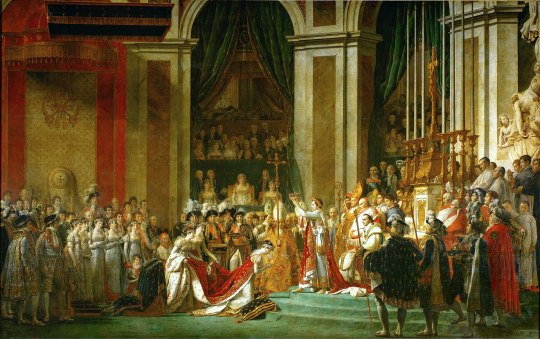
The coronation of Napoleon was the crowning of Napoleon and his wife Joséphine as Emperor and Empress of the French, which took place on December 2, 1804, at Notre-Dame cathedral in Paris. It took the format of a sacred ceremony, in the presence of Pope Pius VII. Preparations for the coronation began in May 1804, when the Sénat conservateur voted to change the constitution to vest the government of the French First Republic's government in an emperor, a move ratified a constitutional referendum in November 1804. Napoleon's motivations for being crowned included a desire for prestige in international royalist and Catholic circles and to lay the foundation for a future dynasty. The event is also regarded by historians as a progaganda exercise. Napoleon's coronation was markedly different from those of the French monarchy and brought together various rites and customs, incorporating ceremonies of Carolingian tradition, the ancien régime and the French Revolution, with a highly luxurious presentation. This large oil-on-canvas painting, titled The Coronation of Napoleon, measures 6.21 m × 9.79 m (20 ft 4 in × 32 ft 1 in) and was painted by Jacques-Louis David (assisted by his student Georges Rouget) between 1805 and 1807, depicting the moment of Joséphine's crowning by Napoleon. The painting now hangs in the Louvre in Paris.
Painting credit: Jacques-Louis David and Georges Rouget
1 note
·
View note
Photo
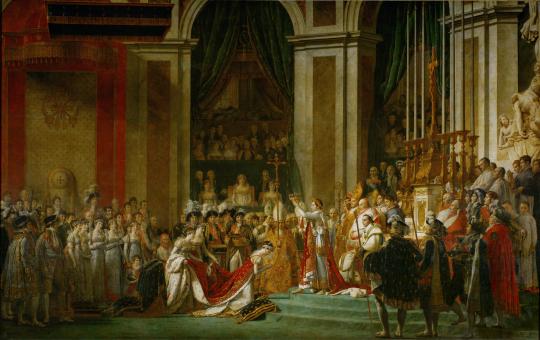
Jacques-Louis David & Georges Rouget, Coronation of Emperor Napoleon I and Coronation of hte Empress Josephine in Notre-Dame de Paris, December 2, 1804, c1805-07. Oil on canvas
85 notes
·
View notes
Photo
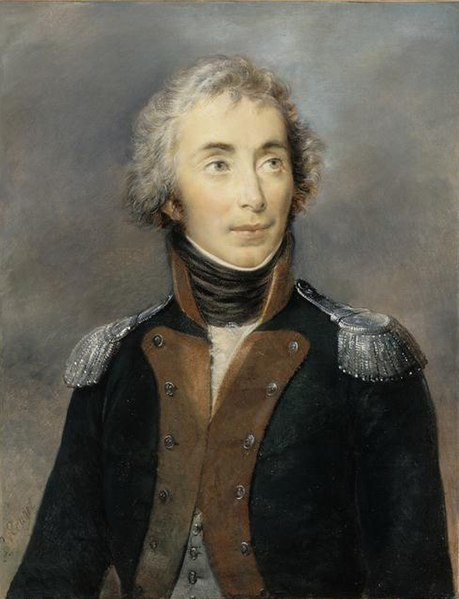
Emmanuel de Grouchy, later Marshal Grouchy, as Colonel of 2nd Dragoons in 1792, by Georges Rouget, 1835
Marshal Emmanuel de Grouchy was a skilled cavalry officer who had a long career of service in the French army. This record has been overshadowed by accusations – originating with Napoleon and his followers on Saint Helena – that Marshal Grouchy was in large part responsible for Napoleon’s defeat at the Battle of Waterloo in 1815. After Waterloo, Grouchy went into exile in the United States, where he began the frustrating process of defending himself against allegations of incompetence, cowardice and treachery. For details, see “Marshal Grouchy in America.”
45 notes
·
View notes
Text
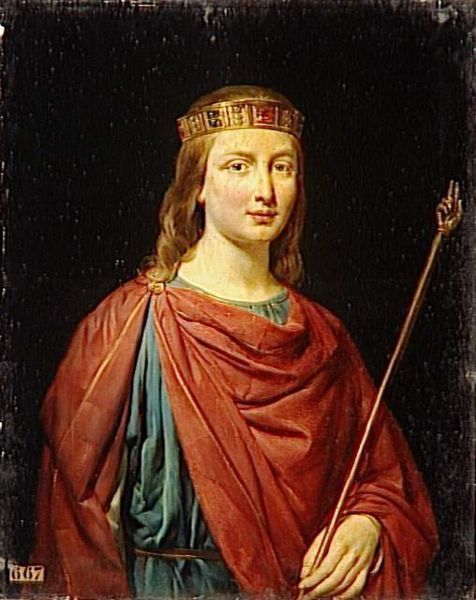
Clovis III roi d'Austrasie par Georges Rouget.
3 notes
·
View notes
Photo
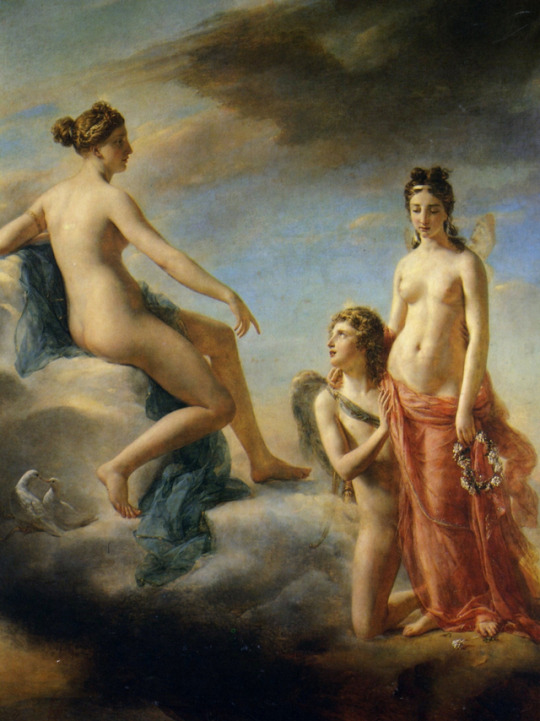
Georges Rouget L'Amour suppliant Vénus de pardonner à Psyché 1827
33 notes
·
View notes
Text
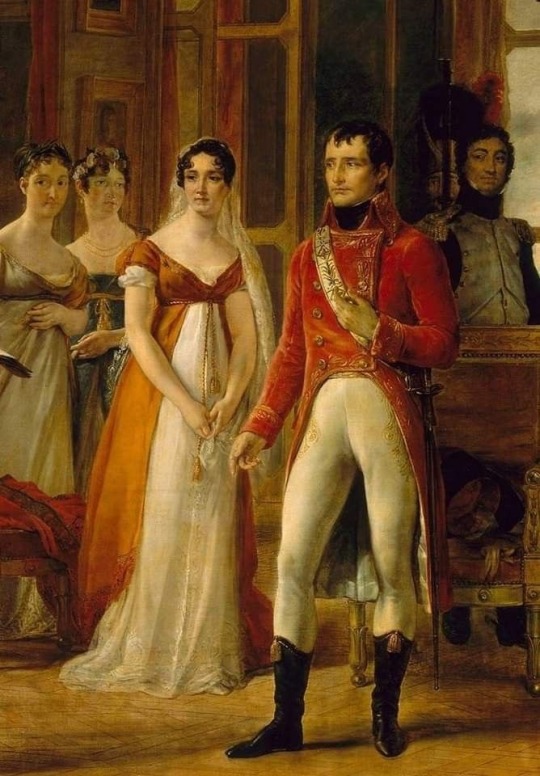
Napoleon and Josephine
This is a detail from the painting depicting the scene at Saint Cloud when Napoleon received the decree that proclaimed him Emperor of the French.
By Georges Rouget
Location: Palace of Versailles
#napoleon and josephine#Napoleon#Josephine#napoleonic era#19th century#first french empire#napoleonic#art#empire style#napoleon bonaparte#josephine bonaparte#empress josephine#pretty#history#historical art#1800s#1800s art#neoclassical#neoclassicism#french#France#French history#frev#French Revolution#consulate#the consulate#the consulate and empire#1st consul#Napoleon as 1st consul#versailles
25 notes
·
View notes
Text

a new month, a new Winter Reading Challenge book rec post ❆
as always, we’re bringing 4 books into the spotlight, as well as giving you some additional recs beneath the cut!

The Lottery by Shirley Jackson
One of the most famous short stories in American literary history, The Lottery paints a scene of a small town, where everything has been prepared for the annual tradition—a lottery in which every family must participate, and no one wants to win.
Ashes, Ashes by René Barjavel
This was to be the happiest day of young Blanche Rouget's life. In Paris, the now-electronic city of love, Blanche had been about to make her debut as a star. Then, abruptly, the Black Emperor of South America had told the world of the missiles already racing northward. Panic had broken forth. And then had come the real terror. A vast cloak of darkness had descended over the earth. And Blanche was hurled into a world gone mad in its death-throes.
Life As We Knew It by Susan Beth Pfeffer
A sci-fi / post apocalyptic narrative about how life on Earth unfolds after a giant meteor crashes with the moon and sends it several kilometres closer to the Earth. The actual science part is done quite well! The writing style may not be everyone’s cup of tea, but the (nearly) believable science really makes this book. (blurb by @mal-studyblr)
Station Eleven by Emily St. John Mandel
One snowy night a famous Hollywood actor slumps over and dies onstage during a production of King Lear. Hours later, the world as we know it begins to dissolve. Moving back and forth in time—from the actor's early days as a film star to fifteen years in the future, when a nomadic group of actors roams the wasteland of what remains—this suspenseful, elegiac, spellbinding novel charts the strange twists of fate that connect five people: the actor, his would-be savior, the actor's first wife, his oldest friend, and a young actress, caught in the crosshairs of a dangerous self-proclaimed prophet.
more recs below the cut:

1984 - George Orwell
Brave New World - Aldous Huxley
The Hunger Games - Suzanne Collins
Oryx and Crake - Margaret Atwood
Do Androids Dream of Electric Sheep? - Philip K. Dick
The Girl With All the Gifts - M. R. Carey
The Maze Runner - James Dashner
Ready Player One - Ernest Cline

#studyblr w/knives reading challenge#knife gang#prompt: dystopia or post-apocalypse#sabrinas posts#sabrinas other#bookblr#bookish#studyblr
88 notes
·
View notes
Photo
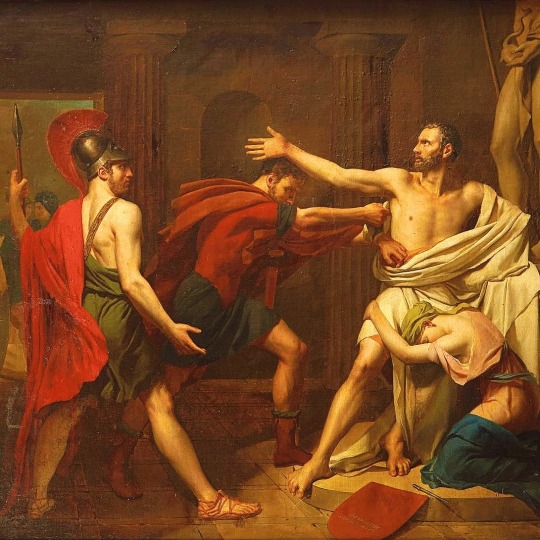
Demosthenes, Taking Refuge in Neptune's Temple, Commits Suicide Rather than Fall into the Hands of the Greeks. 1805. Georges Rouget. French 1783-1869. oil/canvas. http://hadrian6.tumblr.com
88 notes
·
View notes
Text
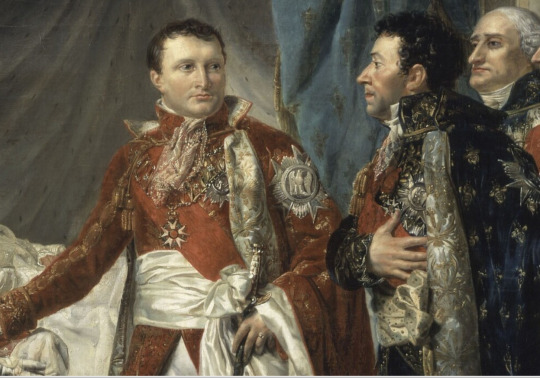
Napoléon Ier présente le roi de Rome aux dignitaires de l'Empire, 20 mars 1811 [detail]. Georges Rouget
11 notes
·
View notes
